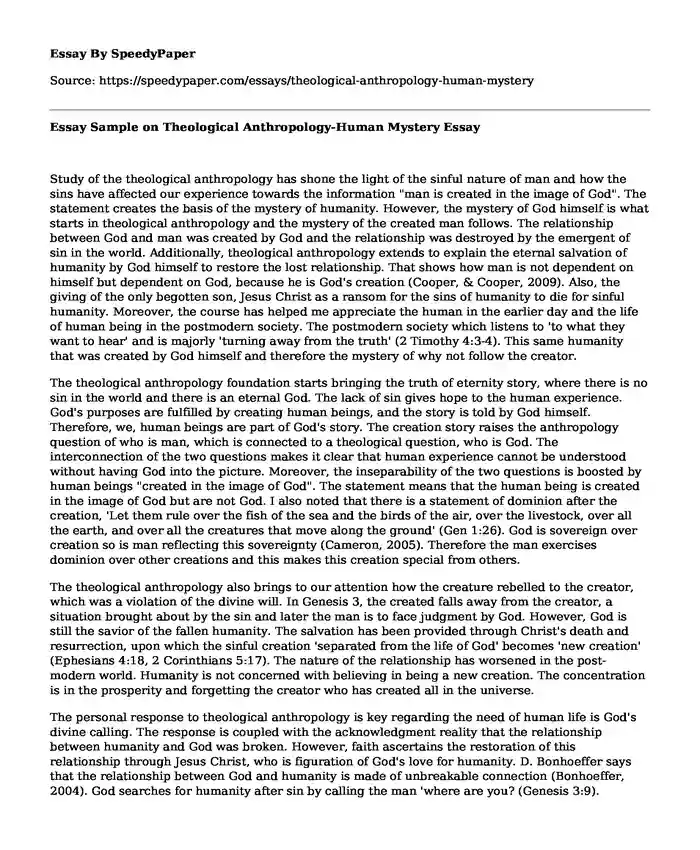
| Type of paper: | Essay |
| Categories: | Anthropology God Christianity |
| Pages: | 3 |
| Wordcount: | 821 words |
Study of the theological anthropology has shone the light of the sinful nature of man and how the sins have affected our experience towards the information "man is created in the image of God". The statement creates the basis of the mystery of humanity. However, the mystery of God himself is what starts in theological anthropology and the mystery of the created man follows. The relationship between God and man was created by God and the relationship was destroyed by the emergent of sin in the world. Additionally, theological anthropology extends to explain the eternal salvation of humanity by God himself to restore the lost relationship. That shows how man is not dependent on himself but dependent on God, because he is God's creation (Cooper, & Cooper, 2009). Also, the giving of the only begotten son, Jesus Christ as a ransom for the sins of humanity to die for sinful humanity. Moreover, the course has helped me appreciate the human in the earlier day and the life of human being in the postmodern society. The postmodern society which listens to 'to what they want to hear' and is majorly 'turning away from the truth' (2 Timothy 4:3-4). This same humanity that was created by God himself and therefore the mystery of why not follow the creator.
The theological anthropology foundation starts bringing the truth of eternity story, where there is no sin in the world and there is an eternal God. The lack of sin gives hope to the human experience. God's purposes are fulfilled by creating human beings, and the story is told by God himself. Therefore, we, human beings are part of God's story. The creation story raises the anthropology question of who is man, which is connected to a theological question, who is God. The interconnection of the two questions makes it clear that human experience cannot be understood without having God into the picture. Moreover, the inseparability of the two questions is boosted by human beings "created in the image of God". The statement means that the human being is created in the image of God but are not God. I also noted that there is a statement of dominion after the creation, 'Let them rule over the fish of the sea and the birds of the air, over the livestock, over all the earth, and over all the creatures that move along the ground' (Gen 1:26). God is sovereign over creation so is man reflecting this sovereignty (Cameron, 2005). Therefore the man exercises dominion over other creations and this makes this creation special from others.
The theological anthropology also brings to our attention how the creature rebelled to the creator, which was a violation of the divine will. In Genesis 3, the created falls away from the creator, a situation brought about by the sin and later the man is to face judgment by God. However, God is still the savior of the fallen humanity. The salvation has been provided through Christ's death and resurrection, upon which the sinful creation 'separated from the life of God' becomes 'new creation' (Ephesians 4:18, 2 Corinthians 5:17). The nature of the relationship has worsened in the post-modern world. Humanity is not concerned with believing in being a new creation. The concentration is in the prosperity and forgetting the creator who has created all in the universe.
The personal response to theological anthropology is key regarding the need of human life is God's divine calling. The response is coupled with the acknowledgment reality that the relationship between humanity and God was broken. However, faith ascertains the restoration of this relationship through Jesus Christ, who is figuration of God's love for humanity. D. Bonhoeffer says that the relationship between God and humanity is made of unbreakable connection (Bonhoeffer, 2004). God searches for humanity after sin by calling the man 'where are you? (Genesis 3:9). Broadly, sin draws us away from God but salvation gets us back to God. Therefore, we need to acknowledge our sinful nature as 'all have sinned and fallen short of the glory of God' and it is only with glorious hope that we 'are justified freely by His grace through the redemption that came by Christ Jesus' (Romans 3:23-24).
In conclusion, God was concerned with the personal transformation of humanity. Therefore, human experience restoration through Christ is guaranteed to them that have faith. However, man still has the will to believe in Christ which is the only way to the Father. Also, the understanding that humanity is created by the image of God gives us the confidence to approach the throne of mercy even in our sinful moments.
References
Bible, K. J. V., & Version, K. J. (2014). BibleGateway.com. Accessed December, 09.
Bonhoeffer, D. (2004). Creation and Fall: A Theological Exposition of Genesis 1-3 (Vol. 3). Fortress Press.
Cameron, C. (2005). An introduction to theological anthropology. Evangel, 23(2), 53-61.
Cooper, J., & Cooper, J. E. (2009). Humanity in the Mystery of God: The theological anthropology of Edward Schillebeeckx (Vol. 5). A&C Black.
Cite this page
Essay Sample on Theological Anthropology-Human Mystery. (2023, Mar 14). Retrieved from https://speedypaper.net/essays/theological-anthropology-human-mystery
Request Removal
If you are the original author of this essay and no longer wish to have it published on the SpeedyPaper website, please click below to request its removal:
- Free Essay in Art: Subject Design in the Scythian, Hiberno-Saxon, and Celtic Art
- Law Personal Statement - Application Essay Example
- Essay Example with the Response to an Article on the Negative Impacts of the Internet
- The Use of Software in the Criminal Justice Systems, Free Essay
- Debt-Financed Tax Cuts - Essay Sample on George W. Bush Policy
- Essay Example Dedicated to Air Asia Company
- Essay Sample on Effects of Addiction on One's Psychology
Popular categories




